新人教版必修2 Unit4 Wildlife Protection知识点课件(60张ppt)
文档属性
| 名称 | 新人教版必修2 Unit4 Wildlife Protection知识点课件(60张ppt) |
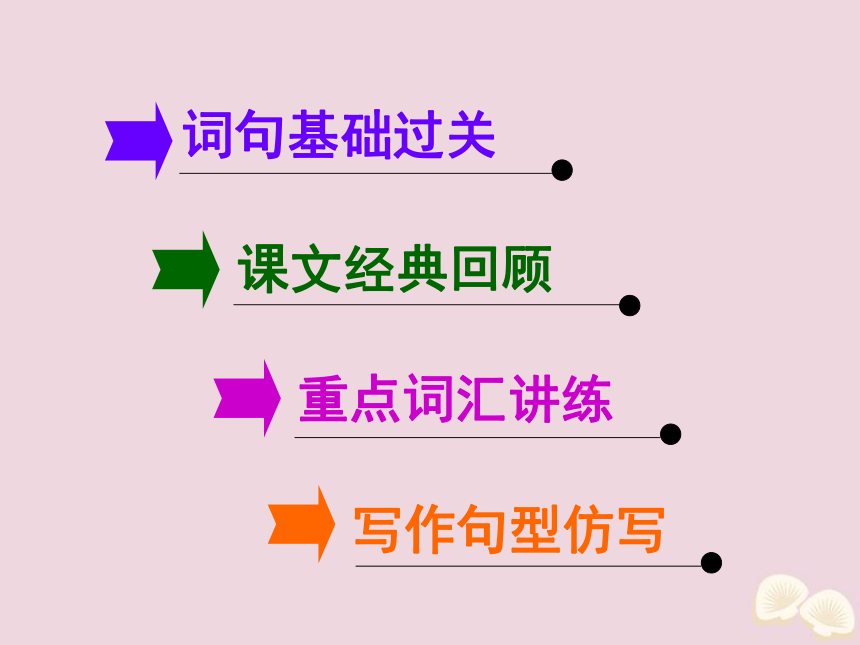
|
|
| 格式 | zip | ||
| 文件大小 | 729.0KB | ||
| 资源类型 | 教案 | ||
| 版本资源 | 人教版(新课程标准) | ||
| 科目 | 英语 | ||
| 更新时间 | 2019-08-25 15:25:58 | ||
图片预览


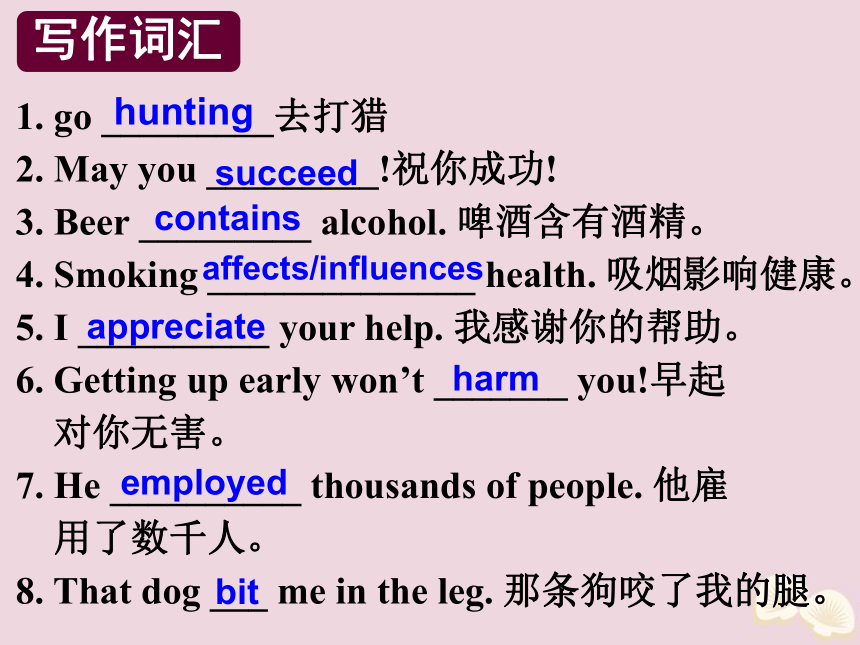
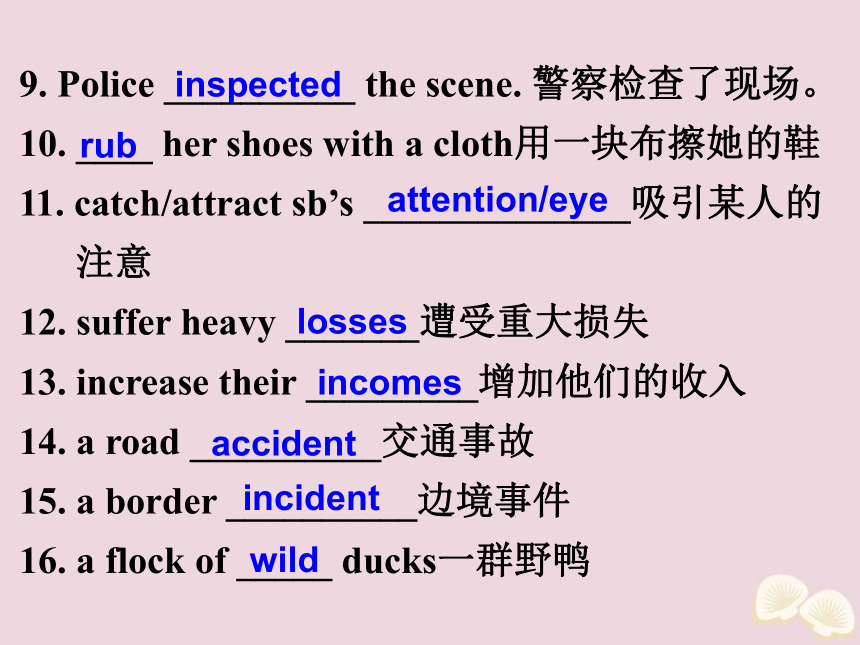
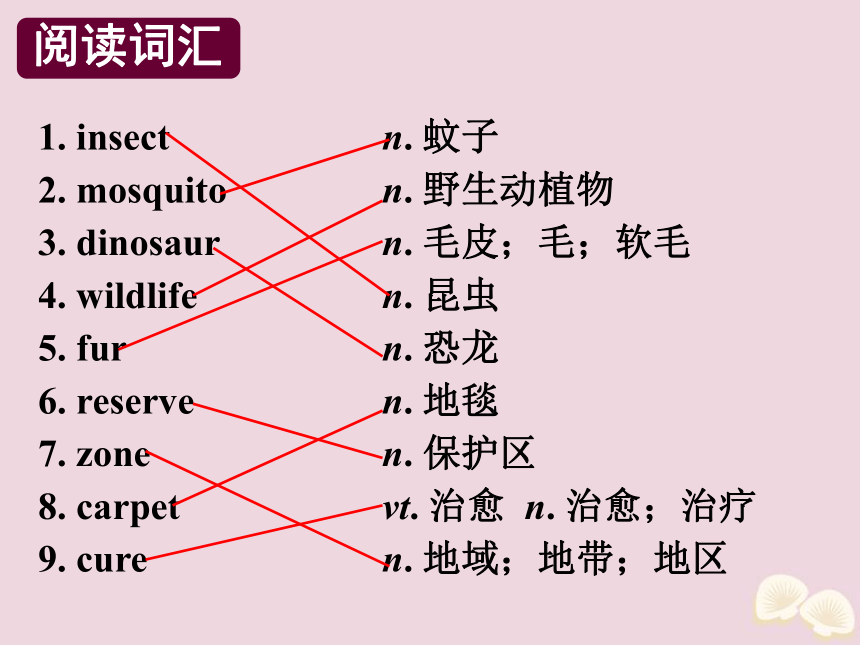
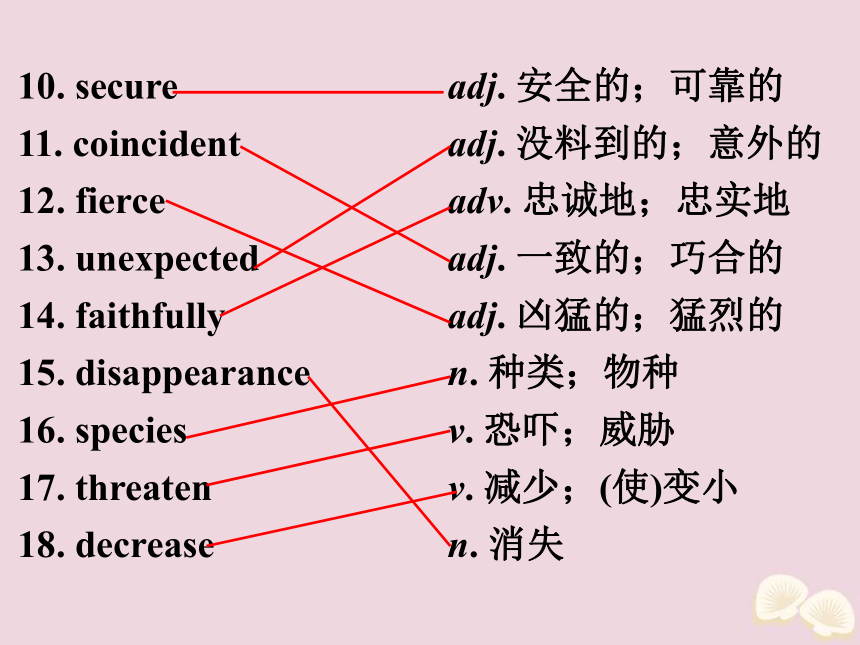

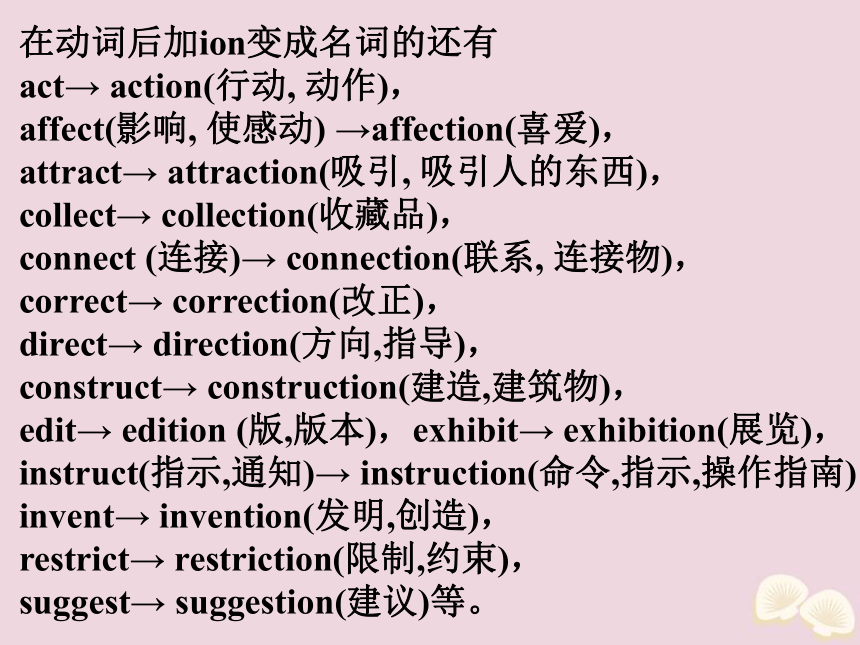
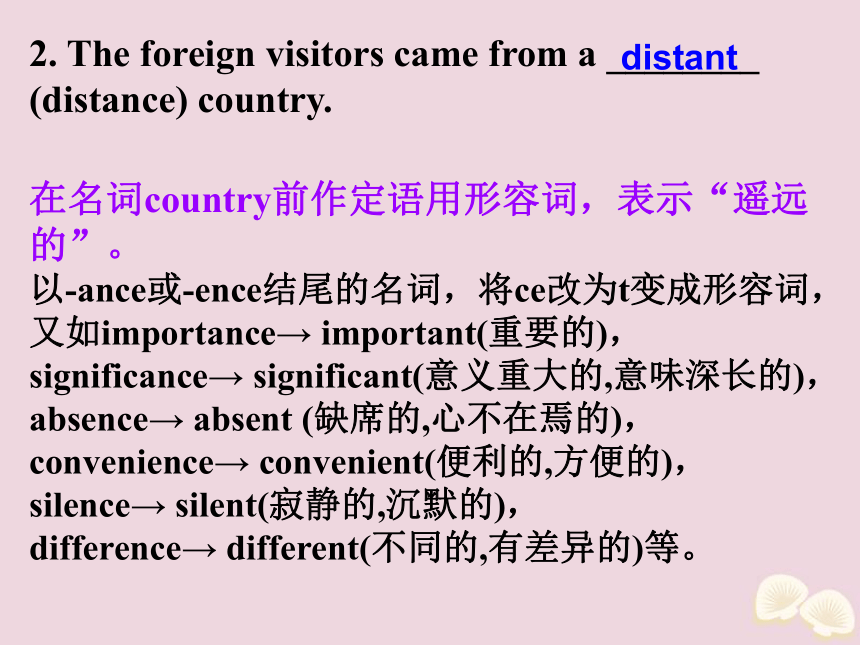
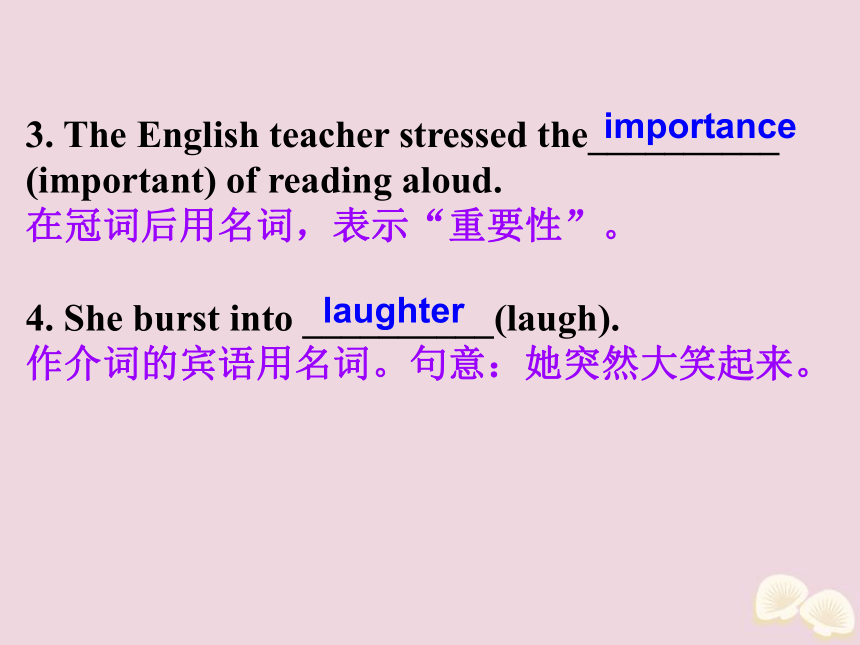
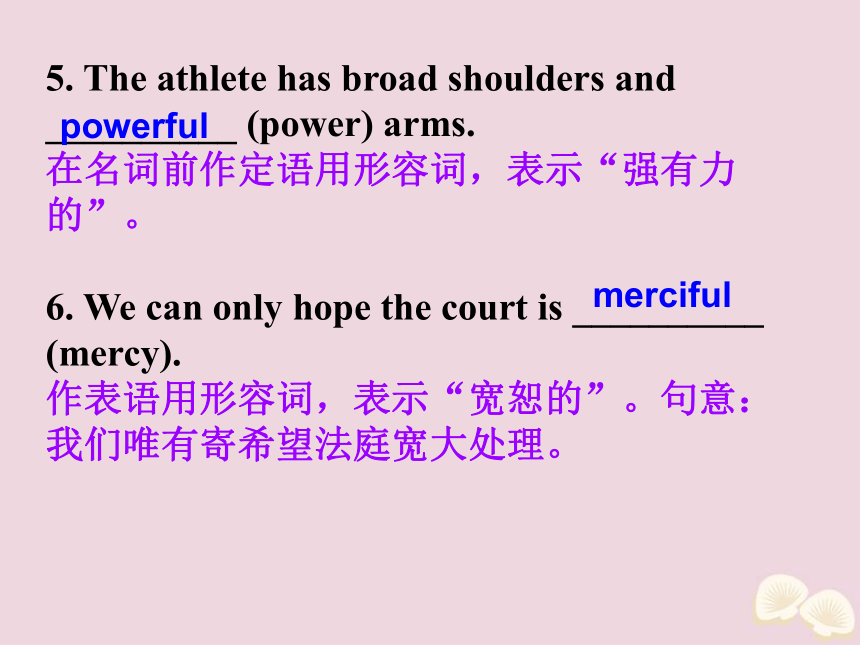
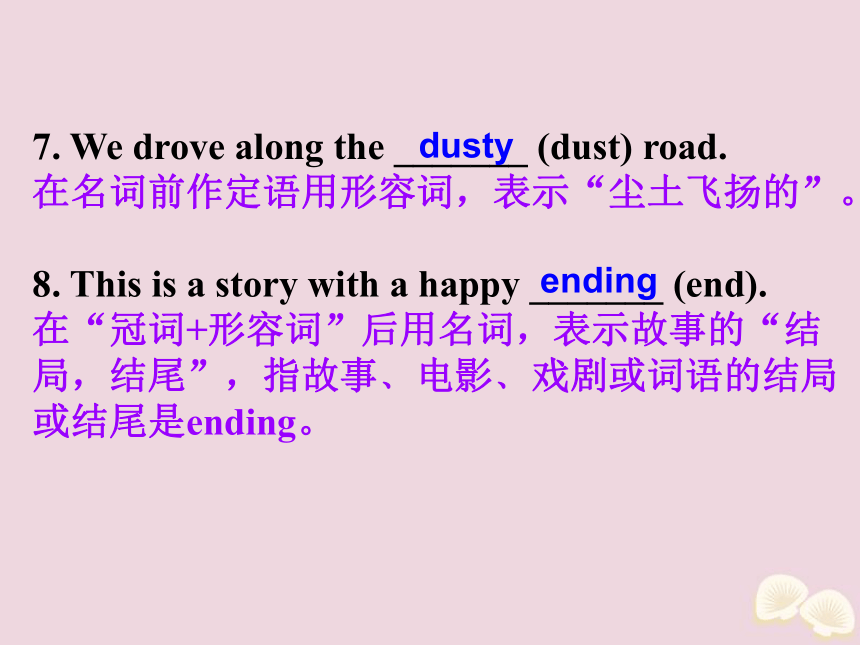
文档简介
(共60张PPT)
课文经典回顾
重点词汇讲练
写作句型仿写
词句基础过关
1. go _________去打猎
2. May you _________!祝你成功!
3. Beer _________ alcohol. 啤酒含有酒精。
4. Smoking ______________ health. 吸烟影响健康。
5. I __________ your help. 我感谢你的帮助。
6. Getting up early won’t _______ you!早起
对你无害。
7. He __________ thousands of people. 他雇
用了数千人。
8. That dog ___ me in the leg. 那条狗咬了我的腿。
bit
hunting
succeed
contains
affects/influences
appreciate
harm
employed
9. Police __________ the scene. 警察检查了现场。
10. ____ her shoes with a cloth用一块布擦她的鞋
11. catch/attract sb’s ______________吸引某人的
注意
12. suffer heavy _______遭受重大损失
13. increase their _________增加他们的收入
14. a road __________交通事故
15. a border __________边境事件
16. a flock of _____ ducks一群野鸭
wild
inspected
rub
attention/eye
losses
incomes
accident
incident
1. insect n. 蚊子
2. mosquito n. 野生动植物
3. dinosaur n. 毛皮;毛;软毛
4. wildlife n. 昆虫
5. fur n. 恐龙
6. reserve n. 地毯
7. zone n. 保护区
8. carpet vt. 治愈 n. 治愈;治疗
9. cure n. 地域;地带;地区
10. secure adj. 安全的;可靠的
11. coincident adj. 没料到的;意外的
12. fierce adv. 忠诚地;忠实地
13. unexpected adj. 一致的;巧合的
14. faithfully adj. 凶猛的;猛烈的
15. disappearance n. 种类;物种
16. species v. 恐吓;威胁
17. threaten v. 减少;(使)变小
18. decrease n. 消失
1. A healthy diet should provide __________ (protect) against disease.
作动词provide的宾语用名词,意为“保护”。
protection
在动词后加ion变成名词的还有
act→ action(行动, 动作),
affect(影响, 使感动) →affection(喜爱),
attract→ attraction(吸引, 吸引人的东西),
collect→ collection(收藏品),
connect (连接)→ connection(联系, 连接物),
correct→ correction(改正),
direct→ direction(方向,指导),
construct→ construction(建造,建筑物),
edit→ edition (版,版本),exhibit→ exhibition(展览),
instruct(指示,通知)→ instruction(命令,指示,操作指南),invent→ invention(发明,创造),
restrict→ restriction(限制,约束),
suggest→ suggestion(建议)等。
2. The foreign visitors came from a ________ (distance) country.
在名词country前作定语用形容词,表示“遥远的”。
以-ance或-ence结尾的名词,将ce改为t变成形容词,又如importance→ important(重要的), significance→ significant(意义重大的,意味深长的),absence→ absent (缺席的,心不在焉的),convenience→ convenient(便利的,方便的),silence→ silent(寂静的,沉默的),
difference→ different(不同的,有差异的)等。
distant
3. The English teacher stressed the__________ (important) of reading aloud.
在冠词后用名词,表示“重要性”。
4. She burst into __________(laugh).
作介词的宾语用名词。句意:她突然大笑起来。
importance
laughter
5. The athlete has broad shoulders and __________ (power) arms.
在名词前作定语用形容词,表示“强有力的”。
6. We can only hope the court is __________ (mercy).
作表语用形容词,表示“宽恕的”。句意:我们唯有寄希望法庭宽大处理。
powerful
merciful
7. We drove along the _______ (dust) road.
在名词前作定语用形容词,表示“尘土飞扬的”。
8. This is a story with a happy _______ (end).
在“冠词+形容词”后用名词,表示故事的“结局,结尾”,指故事﹑电影﹑戏剧或词语的结局或结尾是ending。
dusty
ending
1. ____________ my emails回复我的邮件
2. _________ work/the lost child
搜寻丢失的孩子
3. _____________ the weather report
根据天气预报所说
4. __________________________________
突然笑起来
5. ________________ mosquitoes
保护她不受蚊虫叮咬
respond to
hunt for
according to
burst into laughter/burst out laughing
protect her from
6. _______________ surrounding traffic
注意周围的交通
7. _____________ extinction
处于濒临灭绝的危险中
8. be in danger of __________ 处于灭绝的危险中
9. live _________ and harmony和平与和谐相处
10. long before humans _________________
早在人类形成之前
came into being
pay attention to
in danger of
dying out
in peace
11. He smiled _________. 他如释重负地笑了。
12. It is __________________________________
_____________ that he will agree. 他肯定会同意。
13. She succeeded ___ losing weight. 她成功减肥。
14. Smoking does harm ____ health.
吸烟有损健康。
15. employ him ____________________________
the baby聘请他照料婴儿
to look after/care for/take care of
in relief
certain (在形式主语或形式宾语it后不能
用sure替代)
in
to
16. Everyone lent a hand, __________________ ________ the work was finished ahead of schedule. 每个人都帮了忙, 结果工作提前完成了。
17. He works very hard ____________________
_______ he can pass the exams. 他非常努力以便通过考试。
so that (引导目的状语
so that (引导结果状
语从句)
从句)
1. When scientists inspected the bones, they were surprised __________(find) that these dinosaurs could not only run like the others but also climb trees. 科学家们观察它们的骨头时,惊奇地发现它们不仅跟其他恐龙一样能跑,而且还可以爬树。
to find
2. There Daisy saw an antelope ________ (look) sad.在那里,黛西看到一只羚羊面显哀伤。
3. Some scientists think… others think the earth got too hot for the dinosaurs ________(live) on any more. 一些科学家认为……另外一些科学家则认为,地球变得太热,因此恐龙无法在地球上生活了。
looking
to live
4. That’s good news. It shows the importance
of wildlife protection,but I’d like to help ____ the WWF suggests.这是个好消息,它表明了野生动植物保护的重要性,不过我想按照世界野生生物基金会的建议帮助你们。
5. They learned this _______ the way the bones were joined together. 他们是根据恐龙骨骼的连接方式得知这些的。
from
as
Not long ago there was a girl 1 ________(call) Daisy, who went to see the animals that gave fur to make her sweater 2 ______the help of a flying carpet. In Tibet, she saw an antelope with a sad face looking at her, 3 _____ told her that they were killed for the wool that was taken from under their 4 __________ (stomach). Every year over 29,000 of them were killed, with only 72,000 left. In Zimbabwe, the elephant Daisy saw said they 5 ______ (be) endangered there.
were
called
with
who
stomachs
Farmers used to hunt them because they were considered 6 __________________ (destroy) the farms. Later, the government tried to help the
farmers by asking the tour companies to bring
7 _______ (many) tourists to the area and setting the number of animals to be hunted, which brought the farmers a lot of incomes. As 8 ___ result, farmers started to protect them. In the thick rainforest, Daisy saw a monkey 9 ________ (rub) an insect over his body to protect itself against mosquitoes. With all 10 _____ (she) experience, Daisy had learned how to work with WWF to protect wildlife.
her
to have destroyed
more
a
rubbing
The flown carpet travelled so fast that next
minute they were in Zimbabwe. Daisy turned down and found that she was being watched by
an elephant. “Have you come to take your photo?”
it asked. In a relief Daisy burst into laughing.
“Don’t laugh,” said the elephant, “We used to be an endangered species.
Farmers hunted us with mercy. They said we
destroied their farms, and money from tourists
only went to the large tour companies. So the government decided help. They allowed tourists
to hunt only the certain number of animals
whether they paid the farmers. Now the farmers
are happy and our numbers are increasing.”
1. flown→ flying 表示“正在飞行的”。
2. turned down→ turned around/round 意为“转过身来”。
3. your→ my 意思是:你来给“我”拍照?
4. 删除In a relief 中的a 因in relief是固定词组,意为“如释重负”。
5. laughing→ laughter 习惯上说burst into laughter或burst out laughing。因此,也可不改laughing,而将into改为out。
6. with→ without without mercy意为“毫不留情”。
7. destroied→ destroyed 拼写错误。
8. 在decided后加to 由decide to do sth可知。
9. the certain number of→ a certain number of 意为“一定数量的”。
10. whether→ if 引出条件状语从句,意为“如果”。
appreciate和thank都可表示“感激;感谢”,
但appreciate的宾语一般是sth, 而thank的宾
语一般是sb。
1. appreciate vt. 欣赏;感激;意识到
appreciate 一般用名词、代词或动名词充当宾语,但不能接不定式作宾语。appreciate后也常接代词it(形式宾语),再接if引导的从句。
⑴ The sound quality was poor so we couldn’t fully ____________________(欣赏音乐).
⑵ I would much appreciate ___ if you could come to my party.
⑶ We _______________________________
_____________________________________
___________ (感谢你帮助我们).
appreciate your helping us/ thank
appreciate the music
it
you for helping us /are grateful to you for
helping us
succeed in doing sth 成功做某事
be successful in doing sth 成功做某事
2. succeed vi.成功 vt. 接替;继任
success n.成功;成功的事
____________ adj.成功的
____________ adj.不成功的;失败的
unsuccessful
successful
⑴ The astronauts ____________________
(成功返回) from the moon to the earth according to the plan.
⑵ He ___________________ (接替他父亲) as president of the company.
⑶ One of the keys to ____________ (success) business is careful planning.
successful
succeeded in returning
succeeded his father
⑴ employee n. ____________
⑵ employer n. _______
⑶ employment n. ___________
⑷ unemployment n. _______
⑸ the unemployed __________
3. employ vt. 雇用;利用(时间、精力等)
写出下列词语的汉语意思。
失业的人
雇员,雇工
雇主
雇用; 受雇
失业
⑴ He was employed ____ a bus driver.
⑵ They employed her ________ (look) after
the baby.
⑶ She employs her free time ___ sewing.
⑷ He was employed ____ watering the garden.
in
as
to look
in
harmful adj.有害的
harmless adj.无害的
4. harm n.& vt. 损害;危害
do harm to sb=do sb harm 对某人有害处
There is no harm in doing… 做……是无害的
Harm set,harm get. 害人反害己。
⑴ There is no harm __________ (不妨一试).
⑵ Such books ________________________
__________________________________ (对年轻人危害很大).
do great harm to young
in trying
people /do young people great harm
die away 减弱(以至觉察不到);淡化
die of 死于(饥饿、疾病)
die from 死于(外界的因素)
be dying for/to do sth 渴望
5. die out(指物种)灭绝;慢慢熄灭;渐渐消亡
⑴ Nowadays, many old customs are dying _____ because of the influences of foreign festivals.
⑵ A great number of people died _______the earthquake which broke out at midnight years ago.
⑶ The young man’s grandfather died ____
a heart attack.
of
out
from
The man _____________________________ (有丧命的危险) if he doesn’t accept any operation.
6. in danger (of) 在(...的)危险中;垂危
will be in danger of losing his life
in need of 需要
in honor of 纪念 (=in memory of)
in search of 寻找 (=searching/looking for)
in charge of 掌管;负责
7. burst into tears=burst out crying 突然哭起来
burst into song=burst out singing 突然唱起来
burst into laughter=burst out laughing 突然笑
起来
⑴ Hearing the news that her father died from an accident,the girl ______________________
(突然哭起来).
⑵ All the audience _______________________
_________ (突然笑起来) when they saw the famous comic star’s performance.
burst into laughter/out
burst into tears/out crying
laughing
prevent/stop/keep sb from doing sth 阻止某人做某事
8. protect…from/against… 保护……不受(危害)
⑴ People are becoming aware of the necessity ________________________________________
(保护环境免受污染).
⑵ I tried many times to __________________
___________________(阻止他吸烟),but I failed at last.
to protect the environment from pollution
prevent/keep/stop
him from smoking
catch sb’s attention 吸引某人的注意力
draw sb’s attention to sth 吸引某人注意某事
give one’s attention to 注意……
9. pay attention to 注意
⑴ The famous film star’s performance _____ ___________________________(吸引了所有人的注意力).
⑵ As teachers, we should ______________ ____________________________(更加注意学生的反应) in classes.
pay more
caught all people’s attention
attention to students’ reaction
come into effect 实施
come into use 投入使用
come into power 上台执政
10. come into being 形成;产生
⑴ The new law ___________________ (开始实施) next week.
⑵ The new machines bought last month _____ ______________(投入使用) tomorrow.
⑶ The president of America ______________ (上台执政) in 2017.
⑷When did the universe _____________
(形成)?
come into being
will come into effect
will
come into use
came into power
long/desire/starve to do sth
long/desire/starve for sth
be dying/thirsty/eager/anxious/hungry to do sth
11. long to do sth 渴望做某事
⑴ A great number of young people in the country _____________________________
(渴望城市生活).
⑵ The students in our class _______________ _______________________________________
_______ (渴望上英语课).
⑶ The little boy whose parents are not at home ______________________________________
_____________ (渴望父母亲的爱).
long to have
long for/are anxious for city life
English classes/are anxious to have English
longs for parents’ love/is anxious for
classes
parents’ love
12. be used to doing sth 习惯于做某事
used to do sth 过去常常做某事
be used to do sth(=be used for doing sth)
被用来做某事
⑴ 他过去常和朋友们一起玩,而现在他已经习惯于独处了。
He _____________ with his friends,but now he _________________ alone.
⑵ 水不仅被用来饮用,还被用来灌溉植物。
Water _______________________,but also _____________________.
used to irrigate plants
used to play
is used to staying
is not only used to drink
⑴ 有很多作业要做,我没空陪妈妈去逛街。
___________________________,I have no time to go shopping with my mother.
With a lot of homework to do
⑵ 钥匙丢了,他进不了家门。
_________________,he couldn’t get into his house.
⑶ 她住在那个亮着灯的房子里。
She lives in the house ____________________.
with the light burning
With the key lost
引导目的状语从句时,从句的谓语常有can、could、may、might等情态动词,若从句是
否定结构,则通常用should。引导结果状语从句时,从句谓语不用情态动词。
2. 主句+so that… 以至, 结果(结果);以便(目的)
⑴ 她早上起得早,目的是想成为第一个到达那儿的人。
She got up early in the morning _________
_____________________________________
________________________.
so that /
in order that she could(= so as to /in order
to) be the first to get there
⑵ 他父亲开车时把所有的车窗都关了以免他感冒。
His father drove with all the windows closed _______________________________.
⑶ 珍妮已经知道这个消息了,因此她一点都不开心。
Jenny had already known the news, _________
_______________________.
so that he should not catch a cold
so that
she was not happy at all
way表示“方式;方法”时, 如果先行词way在定语从句中作状语, 那么可以用that或in which来引导, 也可以省略that或in which。如果way在定语从句中作主语或宾语, 则用that或which引导, that/which在定语从句中作宾语时也可省略。
3. the way (that/in which) ……的方法
(1) 学校活动通常被认为是一种不错的交友和培养新兴趣的方法。
School activities are usually considered ______ __________________________and developing new interests.
(2) 往往是你日常生活中发生的事情会改变你看待世界和人们的方式。
Much too often, something that happens in your daily life will change ______________________ _____________ and the people in it.
a good
way of making new friends
the way you look
at the world
Thank you !
课文经典回顾
重点词汇讲练
写作句型仿写
词句基础过关
1. go _________去打猎
2. May you _________!祝你成功!
3. Beer _________ alcohol. 啤酒含有酒精。
4. Smoking ______________ health. 吸烟影响健康。
5. I __________ your help. 我感谢你的帮助。
6. Getting up early won’t _______ you!早起
对你无害。
7. He __________ thousands of people. 他雇
用了数千人。
8. That dog ___ me in the leg. 那条狗咬了我的腿。
bit
hunting
succeed
contains
affects/influences
appreciate
harm
employed
9. Police __________ the scene. 警察检查了现场。
10. ____ her shoes with a cloth用一块布擦她的鞋
11. catch/attract sb’s ______________吸引某人的
注意
12. suffer heavy _______遭受重大损失
13. increase their _________增加他们的收入
14. a road __________交通事故
15. a border __________边境事件
16. a flock of _____ ducks一群野鸭
wild
inspected
rub
attention/eye
losses
incomes
accident
incident
1. insect n. 蚊子
2. mosquito n. 野生动植物
3. dinosaur n. 毛皮;毛;软毛
4. wildlife n. 昆虫
5. fur n. 恐龙
6. reserve n. 地毯
7. zone n. 保护区
8. carpet vt. 治愈 n. 治愈;治疗
9. cure n. 地域;地带;地区
10. secure adj. 安全的;可靠的
11. coincident adj. 没料到的;意外的
12. fierce adv. 忠诚地;忠实地
13. unexpected adj. 一致的;巧合的
14. faithfully adj. 凶猛的;猛烈的
15. disappearance n. 种类;物种
16. species v. 恐吓;威胁
17. threaten v. 减少;(使)变小
18. decrease n. 消失
1. A healthy diet should provide __________ (protect) against disease.
作动词provide的宾语用名词,意为“保护”。
protection
在动词后加ion变成名词的还有
act→ action(行动, 动作),
affect(影响, 使感动) →affection(喜爱),
attract→ attraction(吸引, 吸引人的东西),
collect→ collection(收藏品),
connect (连接)→ connection(联系, 连接物),
correct→ correction(改正),
direct→ direction(方向,指导),
construct→ construction(建造,建筑物),
edit→ edition (版,版本),exhibit→ exhibition(展览),
instruct(指示,通知)→ instruction(命令,指示,操作指南),invent→ invention(发明,创造),
restrict→ restriction(限制,约束),
suggest→ suggestion(建议)等。
2. The foreign visitors came from a ________ (distance) country.
在名词country前作定语用形容词,表示“遥远的”。
以-ance或-ence结尾的名词,将ce改为t变成形容词,又如importance→ important(重要的), significance→ significant(意义重大的,意味深长的),absence→ absent (缺席的,心不在焉的),convenience→ convenient(便利的,方便的),silence→ silent(寂静的,沉默的),
difference→ different(不同的,有差异的)等。
distant
3. The English teacher stressed the__________ (important) of reading aloud.
在冠词后用名词,表示“重要性”。
4. She burst into __________(laugh).
作介词的宾语用名词。句意:她突然大笑起来。
importance
laughter
5. The athlete has broad shoulders and __________ (power) arms.
在名词前作定语用形容词,表示“强有力的”。
6. We can only hope the court is __________ (mercy).
作表语用形容词,表示“宽恕的”。句意:我们唯有寄希望法庭宽大处理。
powerful
merciful
7. We drove along the _______ (dust) road.
在名词前作定语用形容词,表示“尘土飞扬的”。
8. This is a story with a happy _______ (end).
在“冠词+形容词”后用名词,表示故事的“结局,结尾”,指故事﹑电影﹑戏剧或词语的结局或结尾是ending。
dusty
ending
1. ____________ my emails回复我的邮件
2. _________ work/the lost child
搜寻丢失的孩子
3. _____________ the weather report
根据天气预报所说
4. __________________________________
突然笑起来
5. ________________ mosquitoes
保护她不受蚊虫叮咬
respond to
hunt for
according to
burst into laughter/burst out laughing
protect her from
6. _______________ surrounding traffic
注意周围的交通
7. _____________ extinction
处于濒临灭绝的危险中
8. be in danger of __________ 处于灭绝的危险中
9. live _________ and harmony和平与和谐相处
10. long before humans _________________
早在人类形成之前
came into being
pay attention to
in danger of
dying out
in peace
11. He smiled _________. 他如释重负地笑了。
12. It is __________________________________
_____________ that he will agree. 他肯定会同意。
13. She succeeded ___ losing weight. 她成功减肥。
14. Smoking does harm ____ health.
吸烟有损健康。
15. employ him ____________________________
the baby聘请他照料婴儿
to look after/care for/take care of
in relief
certain (在形式主语或形式宾语it后不能
用sure替代)
in
to
16. Everyone lent a hand, __________________ ________ the work was finished ahead of schedule. 每个人都帮了忙, 结果工作提前完成了。
17. He works very hard ____________________
_______ he can pass the exams. 他非常努力以便通过考试。
so that (引导目的状语
so that (引导结果状
语从句)
从句)
1. When scientists inspected the bones, they were surprised __________(find) that these dinosaurs could not only run like the others but also climb trees. 科学家们观察它们的骨头时,惊奇地发现它们不仅跟其他恐龙一样能跑,而且还可以爬树。
to find
2. There Daisy saw an antelope ________ (look) sad.在那里,黛西看到一只羚羊面显哀伤。
3. Some scientists think… others think the earth got too hot for the dinosaurs ________(live) on any more. 一些科学家认为……另外一些科学家则认为,地球变得太热,因此恐龙无法在地球上生活了。
looking
to live
4. That’s good news. It shows the importance
of wildlife protection,but I’d like to help ____ the WWF suggests.这是个好消息,它表明了野生动植物保护的重要性,不过我想按照世界野生生物基金会的建议帮助你们。
5. They learned this _______ the way the bones were joined together. 他们是根据恐龙骨骼的连接方式得知这些的。
from
as
Not long ago there was a girl 1 ________(call) Daisy, who went to see the animals that gave fur to make her sweater 2 ______the help of a flying carpet. In Tibet, she saw an antelope with a sad face looking at her, 3 _____ told her that they were killed for the wool that was taken from under their 4 __________ (stomach). Every year over 29,000 of them were killed, with only 72,000 left. In Zimbabwe, the elephant Daisy saw said they 5 ______ (be) endangered there.
were
called
with
who
stomachs
Farmers used to hunt them because they were considered 6 __________________ (destroy) the farms. Later, the government tried to help the
farmers by asking the tour companies to bring
7 _______ (many) tourists to the area and setting the number of animals to be hunted, which brought the farmers a lot of incomes. As 8 ___ result, farmers started to protect them. In the thick rainforest, Daisy saw a monkey 9 ________ (rub) an insect over his body to protect itself against mosquitoes. With all 10 _____ (she) experience, Daisy had learned how to work with WWF to protect wildlife.
her
to have destroyed
more
a
rubbing
The flown carpet travelled so fast that next
minute they were in Zimbabwe. Daisy turned down and found that she was being watched by
an elephant. “Have you come to take your photo?”
it asked. In a relief Daisy burst into laughing.
“Don’t laugh,” said the elephant, “We used to be an endangered species.
Farmers hunted us with mercy. They said we
destroied their farms, and money from tourists
only went to the large tour companies. So the government decided help. They allowed tourists
to hunt only the certain number of animals
whether they paid the farmers. Now the farmers
are happy and our numbers are increasing.”
1. flown→ flying 表示“正在飞行的”。
2. turned down→ turned around/round 意为“转过身来”。
3. your→ my 意思是:你来给“我”拍照?
4. 删除In a relief 中的a 因in relief是固定词组,意为“如释重负”。
5. laughing→ laughter 习惯上说burst into laughter或burst out laughing。因此,也可不改laughing,而将into改为out。
6. with→ without without mercy意为“毫不留情”。
7. destroied→ destroyed 拼写错误。
8. 在decided后加to 由decide to do sth可知。
9. the certain number of→ a certain number of 意为“一定数量的”。
10. whether→ if 引出条件状语从句,意为“如果”。
appreciate和thank都可表示“感激;感谢”,
但appreciate的宾语一般是sth, 而thank的宾
语一般是sb。
1. appreciate vt. 欣赏;感激;意识到
appreciate 一般用名词、代词或动名词充当宾语,但不能接不定式作宾语。appreciate后也常接代词it(形式宾语),再接if引导的从句。
⑴ The sound quality was poor so we couldn’t fully ____________________(欣赏音乐).
⑵ I would much appreciate ___ if you could come to my party.
⑶ We _______________________________
_____________________________________
___________ (感谢你帮助我们).
appreciate your helping us/ thank
appreciate the music
it
you for helping us /are grateful to you for
helping us
succeed in doing sth 成功做某事
be successful in doing sth 成功做某事
2. succeed vi.成功 vt. 接替;继任
success n.成功;成功的事
____________ adj.成功的
____________ adj.不成功的;失败的
unsuccessful
successful
⑴ The astronauts ____________________
(成功返回) from the moon to the earth according to the plan.
⑵ He ___________________ (接替他父亲) as president of the company.
⑶ One of the keys to ____________ (success) business is careful planning.
successful
succeeded in returning
succeeded his father
⑴ employee n. ____________
⑵ employer n. _______
⑶ employment n. ___________
⑷ unemployment n. _______
⑸ the unemployed __________
3. employ vt. 雇用;利用(时间、精力等)
写出下列词语的汉语意思。
失业的人
雇员,雇工
雇主
雇用; 受雇
失业
⑴ He was employed ____ a bus driver.
⑵ They employed her ________ (look) after
the baby.
⑶ She employs her free time ___ sewing.
⑷ He was employed ____ watering the garden.
in
as
to look
in
harmful adj.有害的
harmless adj.无害的
4. harm n.& vt. 损害;危害
do harm to sb=do sb harm 对某人有害处
There is no harm in doing… 做……是无害的
Harm set,harm get. 害人反害己。
⑴ There is no harm __________ (不妨一试).
⑵ Such books ________________________
__________________________________ (对年轻人危害很大).
do great harm to young
in trying
people /do young people great harm
die away 减弱(以至觉察不到);淡化
die of 死于(饥饿、疾病)
die from 死于(外界的因素)
be dying for/to do sth 渴望
5. die out(指物种)灭绝;慢慢熄灭;渐渐消亡
⑴ Nowadays, many old customs are dying _____ because of the influences of foreign festivals.
⑵ A great number of people died _______the earthquake which broke out at midnight years ago.
⑶ The young man’s grandfather died ____
a heart attack.
of
out
from
The man _____________________________ (有丧命的危险) if he doesn’t accept any operation.
6. in danger (of) 在(...的)危险中;垂危
will be in danger of losing his life
in need of 需要
in honor of 纪念 (=in memory of)
in search of 寻找 (=searching/looking for)
in charge of 掌管;负责
7. burst into tears=burst out crying 突然哭起来
burst into song=burst out singing 突然唱起来
burst into laughter=burst out laughing 突然笑
起来
⑴ Hearing the news that her father died from an accident,the girl ______________________
(突然哭起来).
⑵ All the audience _______________________
_________ (突然笑起来) when they saw the famous comic star’s performance.
burst into laughter/out
burst into tears/out crying
laughing
prevent/stop/keep sb from doing sth 阻止某人做某事
8. protect…from/against… 保护……不受(危害)
⑴ People are becoming aware of the necessity ________________________________________
(保护环境免受污染).
⑵ I tried many times to __________________
___________________(阻止他吸烟),but I failed at last.
to protect the environment from pollution
prevent/keep/stop
him from smoking
catch sb’s attention 吸引某人的注意力
draw sb’s attention to sth 吸引某人注意某事
give one’s attention to 注意……
9. pay attention to 注意
⑴ The famous film star’s performance _____ ___________________________(吸引了所有人的注意力).
⑵ As teachers, we should ______________ ____________________________(更加注意学生的反应) in classes.
pay more
caught all people’s attention
attention to students’ reaction
come into effect 实施
come into use 投入使用
come into power 上台执政
10. come into being 形成;产生
⑴ The new law ___________________ (开始实施) next week.
⑵ The new machines bought last month _____ ______________(投入使用) tomorrow.
⑶ The president of America ______________ (上台执政) in 2017.
⑷When did the universe _____________
(形成)?
come into being
will come into effect
will
come into use
came into power
long/desire/starve to do sth
long/desire/starve for sth
be dying/thirsty/eager/anxious/hungry to do sth
11. long to do sth 渴望做某事
⑴ A great number of young people in the country _____________________________
(渴望城市生活).
⑵ The students in our class _______________ _______________________________________
_______ (渴望上英语课).
⑶ The little boy whose parents are not at home ______________________________________
_____________ (渴望父母亲的爱).
long to have
long for/are anxious for city life
English classes/are anxious to have English
longs for parents’ love/is anxious for
classes
parents’ love
12. be used to doing sth 习惯于做某事
used to do sth 过去常常做某事
be used to do sth(=be used for doing sth)
被用来做某事
⑴ 他过去常和朋友们一起玩,而现在他已经习惯于独处了。
He _____________ with his friends,but now he _________________ alone.
⑵ 水不仅被用来饮用,还被用来灌溉植物。
Water _______________________,but also _____________________.
used to irrigate plants
used to play
is used to staying
is not only used to drink
⑴ 有很多作业要做,我没空陪妈妈去逛街。
___________________________,I have no time to go shopping with my mother.
With a lot of homework to do
⑵ 钥匙丢了,他进不了家门。
_________________,he couldn’t get into his house.
⑶ 她住在那个亮着灯的房子里。
She lives in the house ____________________.
with the light burning
With the key lost
引导目的状语从句时,从句的谓语常有can、could、may、might等情态动词,若从句是
否定结构,则通常用should。引导结果状语从句时,从句谓语不用情态动词。
2. 主句+so that… 以至, 结果(结果);以便(目的)
⑴ 她早上起得早,目的是想成为第一个到达那儿的人。
She got up early in the morning _________
_____________________________________
________________________.
so that /
in order that she could(= so as to /in order
to) be the first to get there
⑵ 他父亲开车时把所有的车窗都关了以免他感冒。
His father drove with all the windows closed _______________________________.
⑶ 珍妮已经知道这个消息了,因此她一点都不开心。
Jenny had already known the news, _________
_______________________.
so that he should not catch a cold
so that
she was not happy at all
way表示“方式;方法”时, 如果先行词way在定语从句中作状语, 那么可以用that或in which来引导, 也可以省略that或in which。如果way在定语从句中作主语或宾语, 则用that或which引导, that/which在定语从句中作宾语时也可省略。
3. the way (that/in which) ……的方法
(1) 学校活动通常被认为是一种不错的交友和培养新兴趣的方法。
School activities are usually considered ______ __________________________and developing new interests.
(2) 往往是你日常生活中发生的事情会改变你看待世界和人们的方式。
Much too often, something that happens in your daily life will change ______________________ _____________ and the people in it.
a good
way of making new friends
the way you look
at the world
Thank you !
